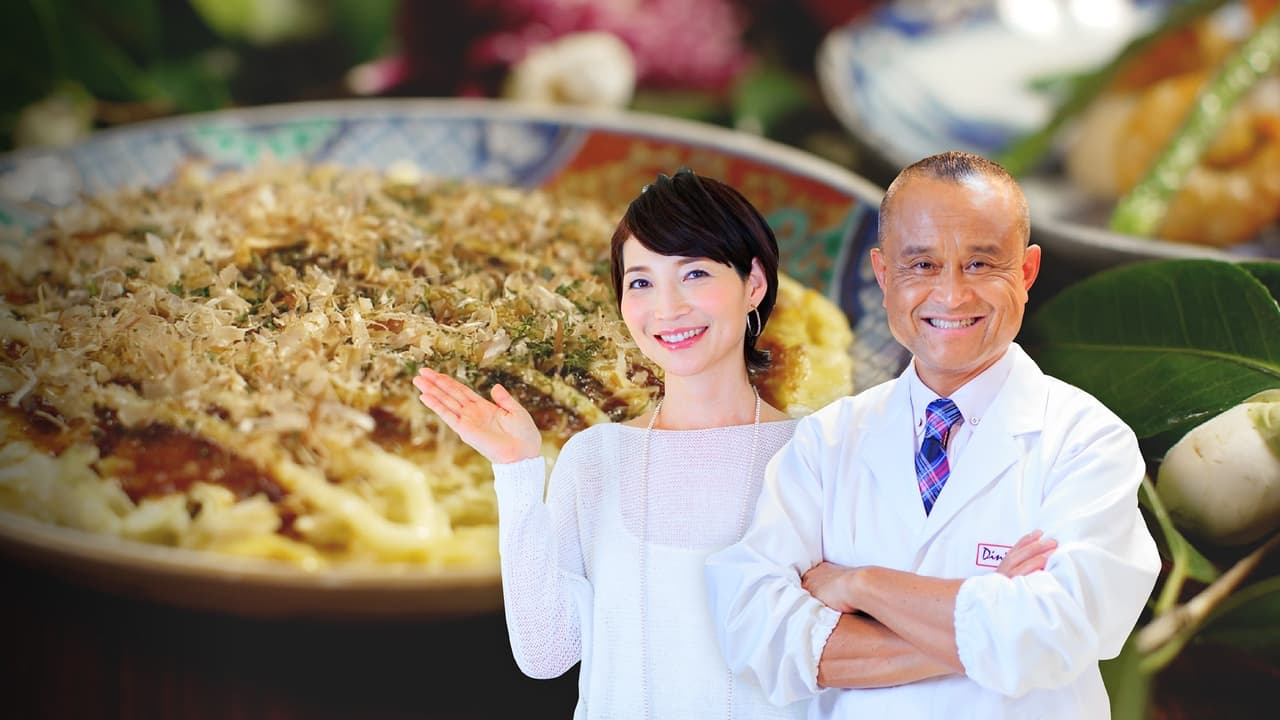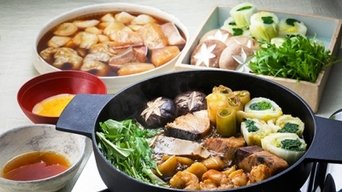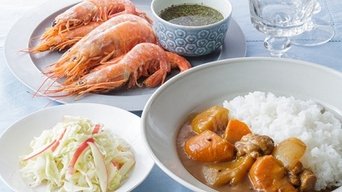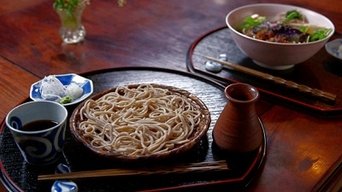Dining with the Chef Season 3

Traditional techniques and resourceful recipes! Chefs Saito and Rika, present their unique approaches to cooking delicious Japanese food.
Watch NowWith 30 Day Free Trial!
Dining with the Chef
2012 / NR
Traditional techniques and resourceful recipes! Chefs Saito and Rika, present their unique approaches to cooking delicious Japanese food.
Watch Trailer
Dining with the Chef Season 3 Full Episode Guide
We're visiting the far northern prefecture of Akita and learning about Akita's cooking over two episodes. In this second episode, we'll learn about koji, used to make indispensable Japanese ingredients like miso, soy sauce, sake, or mirin. The town of Yokote, Akita is famous nationwide for its rice, and the town's food culture features many fermented items based on the use of this exceptional rice has been used to make koji since long ago. By mixing koji and salt, we can make the all-purpose condiment shio-koji that has been sweeping Japan in the past few years. We'll learn a simple recipe to make shio-koji, and see ways to use it to make Japanese dishes even more delicious. This week, we hope to introduce the world to the mysterious and wonderful powers of koji!
We'll be visiting the far northern prefecture of Akita and learning about Akita's local cooking over two episodes. In the first episode, we'll learn about Kiritampo-nabe, a hotpot dish once cooked by the Matagi, hunters who lived in the mountains. This hotpot contains local Hinai chicken, seri, maitake mushrooms, burdock root, and kiritampo, the item that gives the dish its name. Made by mashing rice, then spreading it on a stick and grilling it, kiritampo are perfect for soaking up the rich flavor of the Hinai chicken soup. We'll also learn about Akita's unique food culture, full of the flavors of nature.
Our theme of this episode is making hot pots! We'll be introducing oki-suki, a dish that was once prepared by fishers on their boats during downtime while fishing. The "oki" means "offshore," and the "suki" comes from the name of the dish sukiyaki. With seasonal seafood, including buri yellowtail, and a rich soy sauce-based soup, this hot pot features flavors you'll only find in Japanese cuisine. We'll also show you how to finish up the leftover soup in the traditionally delicious Japanese way.
Our theme in this episode is marinating. We'll be making Yuan-yaki, a dish originating in Japanese traditional culture, by marinating ingredients in yuan sauce and then grilling them. We'll be adding miso to our soy sauce and mirin-based yuan sauce, then marinating salmon and chicken in it to flavor them.
Our theme for this episode is "simmering." We'll be using the unique Japanese ingredient, koya tofu, as our main ingredient, and simmering it alongside three other ingredients. Koya tofu is freeze-dried, so it soaks up soups and liquids, making it a delicious ingredient to use. Our other ingredients, shrimp and chrysanthemum leaves, are both simmered with different methods, and then all three ingredients are brought together at the end for a finished result as beautiful as it is delicious. We'll also be making a unique variant on fried chicken, using crumbled koya tofu for its breading.
This week, we'll be making the famous Japanese dish tempura, but with a twist! For our main dish, we'll be making rice balls — a Japanese favorite — with shrimp and scallop tempura inside. We'll also be making a light beef shank soup to help warm the body on these cold winter days, as well as a delicious sauté made with vitamin-rich spinach, fresh cream, sesame oil, and soy sauce, for a surprisingly delicious combination of flavors.
Our main focus this episode is on shabu-shabu, a famous Japanese dish on par with sushi or tempura. We'll be using soy milk, a convenient way to get the healthy protein of soybeans, to make the shabu-shabu broth with Chinese and Japanese chili spices and use it to quickly and deliciously cook plenty of pork and vegetables.
Our theme of this episode is kneading. We'll teach you how to make chicken tsukune meatballs for a soup, by kneading ground chicken until it develops enough stickiness to come together into balls. We'll also show you the unique Japanese ingredient you can add to make your tsukune meatballs light and tender. Our soup this week has a wonderfully high-class feel to it as well. Finally, we'll show you an alternative way to serve the tsukune meatballs, with a sweet and savory mitarashi sauce.
Our theme of this episode is sushi. We'll be introducing sushi, that most famous of Japanese foods. We'll invite Chef Yasuda, who has dedicated himself to sushi for thirty years, including running New York's top sushi shop. He'll show us how to make Edo-style sushi with the finest ingredients, sharing the secrets of how to cook the rice, prepare the fish, put the sushi together, and even the best way to eat it. He'll also teach us about nori-wrapped negitoro rolls.
Our theme of this episode is warm noodles, full of the best of land and sea, to make cold winter days better. The port city of Nagasaki, on the island of Kyushu in southwestern Japan, remained open to foreign trade even when Japan closed itself off from the 1600s to the 1800s. As a result, Nagasaki developed its own unique food culture, and this week Rika will be making her own version of Nagasaki's famous noodle dish, champon.
Our theme this of episode is the fall harvest. We'll be cooking a meal with the ingredients and flavors of fall. Our main dish will be salmon and three types of mushrooms, wrapped in foil and baked. We'll also be making beautiful sweet potatoes simmered in syrup, with the purple of the skins contrasting with the yellow of the inside. Finally, for our third dish, we'll be making a delicious bacon and burdock root soup with dashi made from kombu kelp and bonito flakes.
Our theme of this episode is deep-frying. We'll be working with mushrooms, in season for fall, and making Autumn Kakiage mixed tempura with a variety of ingredients, like lotus root, maitake mushrooms, scallops, shrimp, and more, for a deliciously crunchy and colorful dish. We'll also make a variation on the recipe, letting the flavor of nori shine in our chicken tenderloin nori-fry.
The theme of this episode is "grilling." We'll be introducing the Japanese favorite, kabayaki. We'll learn the easy way to spread open sardines for kabayaki without even using a knife. We'll also learn about how to make a variation on kabayaki by flaking the sardines and adding dashi stock, to make delicious hitsumabushi.
The theme of this episode is deep-frying. We'll be using top-quality flounder and preparing it ikada-age style, making even the bones delicious. We'll fillet the flounder into five pieces, soak it in salt water, and fry them up to look like little rafts that could float on water. After frying the flounder to get crispy bones and tender meat, we'll be making green tea soba noodles with chili-seasoned grated daikon and ten-tsuyu sauce for a dish as beautifully reminiscent of pine needles as it is delicious.
Our theme in this episode is simmering. We'll be making Simmered Taro and Beef with ingredients that are in season for autumn. With its sauce made with a shiitake dashi stock, and its beautiful glaze, this is one dish sure to make anyone hungry. We'll also be putting a unique spin on a classic by making chewy croquette with the simmered taro and ginger.
Our main dish in this episode is menchi katsu, just as delicious hot and fresh as it is cooled down. Mix meat and vegetables, make patties, and bread them. Fry them up and they're nice and crunchy on the outside, juicy on the inside, and absolutely irresistible. We'll also take a look at three great sides to go perfectly with menchi katsu in your next bento lunch box!
There are many variations of curry, which is popular around the world. It is said curry was originally brought to Japan from the U.K. and it has evolved, adjusting to Japanese palates. In this episode, Rika is making Japanese-style curry and rice. Using her creativity, she makes it extra special.
Our theme this week is the American-born Japanese food, the California Roll. Featuring colorful fillings like salmon and avocado, and with decorations on the outside, too. We'll also be making a side dish that'll teach you the secrets of how to use the sushi staples, wasabi and nori.
The theme of this episode is pan-frying. Chef Saito will be showing us a Japanese twist on steak, a worldwide favorite. The secret is the ume-sesame sauce: the tartness of the sauce goes perfectly with the fattiness of the steak, for a clean, delicious flavor. We'll also be learning how to make miso soup with tofu and wakame seaweed, a Japanese standard. We'll be making it with a niboshi dried fish dashi as the base, for a delicious side to go perfectly with our steak!
Our main dish in this episode is made with edamame, in season for summer and finding popularity all around the world! East meets west for our edamame pasta dish, and with a cold eggplant salad on the side, and the popular Japanese summer dessert mizu-yokan, all three of our recipes will help you stave off the summer heat!
Our theme of this episode is marinating, and our teacher will be Chef Saito, mentor to a number of famous chefs worldwide. We'll be learning how to prepare fish by tossing it with salt to remove the moisture, then marinating it in vinegar. Vinegar marination is a technique invented long ago in Japan to preserve fresh fish, and has been passed down for generations. It's great for not just preserving fish, but for using the vinegar to give fish a delicious flavor that's unlike sashimi. We'll also be learning a modern spin on the recipe that's rolled up in nori with uniquely Japanese herbs — don't miss it!
Our theme of this episode is handmade soba noodles. Our teacher will be the handmade soba master, Akila Inouye, showing us a fail-safe method for delicious soba noodles that even beginners will have no trouble with! We'll be cooking mori-soba, the best way to enjoy their natural buckwheat flavor. In addition to soba noodles, we'll also show you how to make a dipping sauce, and a delicious bukkake soba recipe with seasonal vegetables and duck! This will be the perfect first steps on your journey to becoming a master yourself!
Our main dish in this episode is Yakisoba, a staple of Japanese summer festivals. We're using plenty of shrimp and vegetables, and adding some salt and nam pla to give it a light, clean flavor. We'll also be preparing a squid salad with lemon, and a sautéed liver side seasoned with a variety of Asian flavors to give us the energy to beat the heat, for a meal perfectly suited to the season.
In this episode, we will learn about Nikujaga, the very popular Japanese food. Its ingredients are very simple, so even if you are not in Japan, you can still make it easily. Our version of this recipe adds a Chinese chili paste, Douban-jiang. The chili's fragrance and the miso's richness will enhance the complexity of the dish's flavor. This Japanese home cooking classic will turn out to be something unique and surprising.
In this episode, we're going to take a look at Kushiage or deep-fried skewers, one of the popular local foods of Osaka's unique food culture. We'll be using Rika's selection of pork, asparagus and three other ingredients, and we'll deep-fry them using two types of breading, for two different textures. In addition, we also will make three sauces to add more variety.
The theme of this episode is "Deep frying." We'll be making crispy deep-fried chicken wing Kara-age, flavored with sake and soy sauce and served with a Japanese-style negi green onion sauce made with dashi stock, and beautifully garnished with shishito chili peppers and white negionion. We'll also show you how to easily remove chicken bones! For another variation, we'll try something unique with our chicken wing Kara-age lettuce wraps, made with red miso paste and mayonnaise — perfect for any party!
Rika grew up in a large city named Fukuoka. It is considered to be one of Japan's culinary destinations with everything from delicious street food to high-end cuisine. Today, she is making 3 dishes and all of them are local Fukuoka specialties.
Our main dish in this episode is udon, the Japanese noodles that are becoming popular worldwide. We'll show you how to make chilled udon with Rika's delicious dipping sauce that combines the appetizing aroma of sesame seeds with the flavor of the Chinese condiment douban-jiang. The sauce also goes great with Chinese noodles or phở, too, making it a great recipe to know.
The theme for this episode is sautéing. We're going to cook a world-famous Japanese food, teriyaki swordfish. The thick-sliced, nicely-browned swordfish is sautéed in the sweet, aromatic teriyaki sauce until it's been glazed beautifully. For our second dish, we're making daikon radish steak, sautéed in great-smelling sesame oil, and topped with grated daikon to add a refreshing flavor.
The theme for this episode is a hand-rolled sushi party that children can enjoy, too! Our main sushi roll fillings will be chicken soboro and egg omelet. It is perfect for people who don't eat raw fish or who live in areas without easy access to fresh fish. We'll also show you how to make grilled tofu with a miso sauce which is perfect as an appetizer, as well as a warming Japanese comfort food, shiratama-shiruko (sweet azuki bean soup with rice dumplings) for dessert.
The theme for this episode is "cutting". We take a look at ushio-jiru soup using an in-season fish, sea bream. We'll show you how to fillet a sea bream and create a delicious soup with a fantastic aroma. It's garnished with iris-shaped udo and rapini to add a lovely touch of spring. The second dish is rice with sea bream, which uses dashi and leftover fish from the ushio-jiru soup, bringing out the umami of the sea bream.
A tonkatsu sandwich of fresh pork loin covered in a crisp bread-crumb coating and wrapped in lovely soft bread, is wonderful when you feel like treating yourself for lunch. Packed in a lunch box with some pickles, it's also perfect for a picnic amongst the cherry blossoms!
Free Trial Channels
Seasons






































